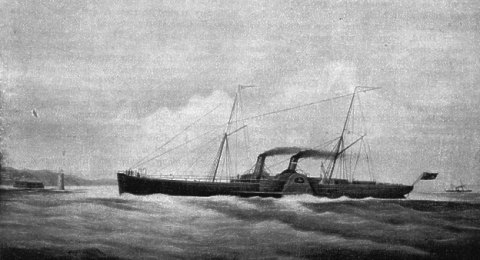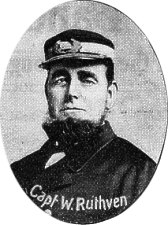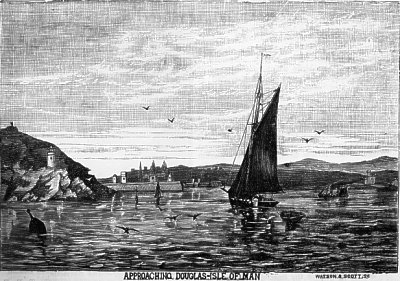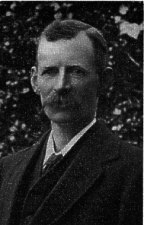
Douglas (II.) commanded by the late Captain Ruthven, on which " A. C." and the German Band embarked
[From The Manxman, #10 1913]
"My lad, he only said she'll soon shift them herself."

Douglas (II.) commanded by the
late Captain Ruthven, on which " A. C." and the German Band embarked

The Late Captain Ruthven
When I was a very small boy, the idea of my life was to go to the Isle of Man in the Douglas the celebrated old Douglas of the 'sixties and 'seventies.
I used to watch her from New Brighton with the smoke pouring out of her two red funnels as she went by, loaded with passengers, till all that was left of her on the horizon was smoke; and yet I never could hope to go.
But one day, my father said he was going to the Isle of Man, and he would take me, in the Douglas, the very next morning. I thought it never would come; but it did-a stormy day in March, with blue sky and yellow clouds drifting before a north-westerly gale. That was nothing. All I thought of was the Douglas.
Outside New Brighton I heard my father say something to the effect that there were " big white horses on the banks," and then a band of music began to play on the deck somewhere, and played a lively tune. There it was, right in the bow of the boat, and, though a very ordinary German combination with trumpets as hoarse as they could possibly be, it seemed inexpressibly grand to me.
"Father, what did the Captain say to you, just now?" I enquired.
" Oh! my lad, he only said ' She'll soon shift them herself,' " he answered.
" But what did you say to him P"
" I asked him if he didn't' think we were 'in for it?' and he said 'Yes, I fancy we are.' " But I was listening to the band, wondering how they could play with the boat tossing. Then we passed a lightship, and two men pulled the wheel round, which spun like a top, when quite suddenly the band stopped playing. I heard all the men shouting, and a wave came which wet them through, and they ran down the ladders on to the deck below and disappeared.
I didn't know then that it was Captain Ruthven, but I remember his little goatee whisker that stuck out from his chin and curled up like a wave, and a twinkle he had in his eye when the band stopped playing, for he looked quite pleased about it.
A sailor came and dressed him in oilskins, while two more stood at the wheel and put theirs on.
" We are in for it," my father said, " let's go and look for the band.'
I thought I would like to see the cabin, but just when I got to the door I saw the steward with a lot of plates which he held tight under his chin with both arms. Suddenly he threw them in the air and clung to the balustrade, and the plates went down crash into the cabin, and I didn't go after them.
"Come along here," said my father, who was roaring with laughter, " I've found the band. Come and look at it."
He took me between the paddle-boxes, and I saw a lot of men lying in the water all mixed up with the trumpets. Two of them were lying with the drum on the top of them, and the fat one had got his head down the big trumpet; he was awfully sick.
" There'll be no more music to-day," said my father, " except what you hear now," and he was quite right.
That was the last I saw of them, for it came on dark soon after, and we went on to the topdeck, into a dry corner, and I watched the light on Douglas Head I thought for more than two hundred hours. The captain kept shouting " Port a point " or " Steady," nearly the whole time, from behind the front funnel.
My father said next day that we had only been nine hours after all, but I didn't quite believe him. Then he laughed and said, " I wonder what became of the band." A. C.
The Quaint Experiences of an Early Tourist
"I embarked on board the "George" sloop. Two Little Manks Misses, from a Liverpool school, were the only passengers besides myself."
As will be seen in one of the " Seabreeze " paragraphs in this number, the Rev. Canon Grensted has been lecturing on voyages to the Isle of Man a thousand years ago, which is a pretty good while back. For me, to go so far behind is, as Captain Nares once remarked to Loudon Dodd, " beyond my register," but a valued correspondent, " J. A. B." sent the following in for the weekly article, entitled " Seabreezes," which I have, for a long time past, written in the "Liverpool Express," so I felt sure he would allow me to transfer it to the" Three-Legged Magazine." Accordingly we now get the personal experiences of a traveller who "crossed " one hundred and twenty-nine years ago. How lucky there was no Ben-myChree in those days! If there had been this intrepid tripper would have thought so little about the Journey in 1784 that he never would have written anything about it for our benefit in 1913. Moreover, I think "J. A. B. " will, by next month, tell us just what the old traveller thought about the Island which, except for a flew piers, boarding-houses, motor-cars, cinematograph shows and such like things, is just the same now as it was then. This is what the 1784 tourist wrote:
May 1st, 1784. The dreary aspect of this Island almost chilled my blood, as I Contemplated it from the sea. But, perhaps it may abound with internal beauties as the Manks here assure me it does. And every object and occurrence you may expect me to mention, not with any regard to method and order, but as they affect me at the moment.
I embarked early on Thursday morning last, on board the " George," sloop. Captain Caldwell. Two little Manks Misses, -just let loose from a Liverpool school, were the only passengers besides myself. Not a breath of wind had we to waft us down the Mersey; not a zephyr was there to rufe the tranquility of its bosom; on which, as in a mirror, was reflected every object on its banks, and every vessel on its surface. A tedious time were we in turning the Black Rock, and a full more tedious time in gaining the offing. The Welch hills appeared at a distance, and covered with snow, notwithstanding the fineness of the weather; and Penmaeumawr, " heaped hideous to the sky," towered above them all. That side of the mountain, however, which was in our view, had not such a horrid appearance; it is that side only that looks towards Anglesea that terrifies the spectator with its tremendous aspect. In the evening I had the pleasure of 'contemplating the setting sun to the utmost., advantage. As I beheld it appear úg'gradually to sink beneath the waves, and leaving the heavens arrayed in clouds of the richest and most beautiful colours, I could not forbear exclaiming with Milton,
"These are Thy glorious works,
Parent of good, Almighty!
Thine this universal frame
Thus wonderous fair."
The departure of the sun was succeeded by the appearance of the moon, whose pale beams, sporting on the water, formed a striking contrast to that glitter of the sea that had been dazzling our eyes during the whole of the day. I felt myself not sufficiently easy in the body to indulge romance and melancholy; else the contemplation of the moon pursuing her course through the unclouded arch of heaven, while an almost universal silence reigns around, the ear catching no noise except the full noise of the sea, is admirably adapted to the pleasures of melancholy. Notwithstanding the darkness, the narrowness and the shortness of the hole I lay in, which much resembled the niches I have seen in churches, where lie the effigies of the dead, it was by the crew esteemed a most excellent bed. Indeed, I slept tolerably well in it the first night, and arose early enough the next morning to contemplate the sun emerging from the waves. The second night we were attacked by a violent squall, and the consequent reeling of the vessel made me terribly sick. The agitation occasioned by my isickness, with the extreme heat I experienced, made me wish for the refreshing air of the deck; but on attempting to clamber out of my crib I found one half of the opening of my bed blocked'-by the cabin door, which was rendered immovable to my feeble strength by some weighty body rolled against it by the motion of the vessel. All hands being employed above, I saw little probability of being quickly sec at liberty. I resolved, however, to make an effort to thrust myself through the little opening that remained. Accordingly, exerting all my strength, with much difficulty I got my neck and head through; and with a little more squeezing and struggling made shift to thrust out one half of my body; but, alas! there did I stick like a mouse in a trap; nor could I by any possible means move myself either backwards or forwards; either sideways, upwards or downwards. In this situation, too, I was sick in the extreme; and in this situation, too, I was rocked up and down by the turbulence of the waves, like an infant in his cradle. Have you not sometimes observed, upon our Gothic steeples half the figure of a man projecting from the battlements, with his mouth wide open, serving as a conductor to the rain? This is, I confess, a far fetched similitude: but it may serve to give you a more exact idea of your brother in his miserable condition than mere description can convey.
I was, however, at length relieved from it by the sudden shifting of the wind, which, blowing violently upon that side of the vessel where I hung, overset with a dreadful crash, tea tables, cups, dishes, and in short everything moveable; and rolling away the weight which kept fast the door, it immediately flew open, and down I fell amid the general wreck.
It is impossible to give an idea of the joy which those disused to the sea feel upon landing after a sick and tedious passage. The body is agitated with the various pains arising from sickness and its attendant hunger (though at the same time the very sight of food increases one's sickness. When I landed this morning, I thought myself perfectly capable of conceiving the amazing joy described in Anson's Voyage of the Centurion's crew, upon their first setting their feet on the shore of Juan Fernandez. It was a pleasure not easy to be imagined to enter a room exactly clean and neat, and to be regaled with the very food I had, during the whole of the passage so eagerly wished for, after having been confined two days and two nights within a nasty bed, to whose foul mouth no wholesome air breath'd in, and after inhaling the various offensive vapours of the vessel and hearing little else but the groans and lamentations of the s'ck.
It being past high water when we arrived in Douglas Bay, we entered the town in a fishing boat, sailing under a range of rocks tremendously rugged and lofty, and covered with horses and sheep, together with various kinds of wild fowl. The greatest part of this afternoon I have spent in bed, and feel amazingly refreshed with coffee and sleep. Mrs. Wilson, my landlady, is an English woman, fat as a puffin and good-humoured as fat. Apropos of puffins, these are birds which breed in rabbit holes, on an insular rock called the Calf of Man, situated about half a mile from the southern extremity of this island. They are almost a lump of fat, and are esteemed very delicious eating. The season for them is not till June, so that I shall not have the pleasure of feasting on them. I have been strolling about the town here, which, though the largest in the island, is less than our English market towns of a moderate size. It is romantically situated on the side of a lofty mountain, which forms a part of its bay, and contains two churches besides the parish church, which stands at some distance from the town, where divine service; is performed in the Manks language.

An old Woodcut showing the old entrance to Douglas Harbour as it was many years ago
NOTE.-One's heart aches for the troubles of trippers of a hundred and twenty nine years ago. Surely something better could have been done for them than " a short narrow hole to sleep in." How they would have appreciated the " Ben," the new. King Orry or the Snaefell ! EDITOR.

Who, last month, won the Manx Walking Race, which involved touching each of the seventeen ancient Parish Churches, a distance of 80 miles, in less than 18 hours.
The photo was inscribed:--To T,E.E., with H. Bridson's compliments,.and happy recollections of many keen, hard fought cricket matches together.
A lady, seventy-six years of age, wrote to her son from Colwyn Bay, as follows:
Many thanks for the copies of the " Manxman." You don't know what a treat it is to me to read about those whom
I remember so very many years ago. The early history of the steamers is also familiar to me. My dear father was a shareholder in the Steampacket Co., and when the first Ben-my-Chree made her first trip to Dublin he went with the rest of the shareholders. It was a lovely day when they started, and he went very thinly clad. On the return journey it became very cold and he got such a cold that he had to leave business and go to his mother's at Kirby, to be nursed. He was there eighteen months before he was fit to do anything, so it was rather a dear trip for him.
It is wonderful how we keep continually 1.dding to the venerable history of our steam packets, and I venture to ask this lady if she will be so kind as to jot down some more reminiscences. I feel sure she must have known Captains Gill, Quayle and Kermode.
T. E. E.
|
|
||
|
|
||
|
Any comments, errors or omissions gratefully received
The Editor |
||